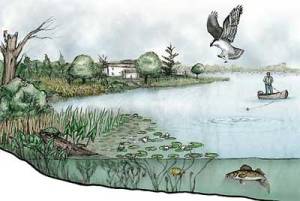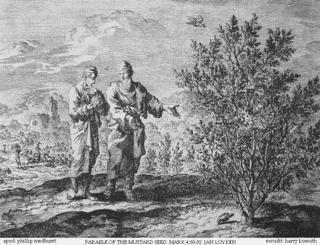Related Research Articles
The meaning of life pertains to the inherent significance or philosophical meaning of living. There is no consensus on a definitive answer, and thinking or discourse on the topic is sought in the English language through the question, "What is the meaning of life?". There have been many proposed answers to these questions from many different cultural and ideological backgrounds. The search for life's meaning has produced much philosophical, scientific, theological, and metaphysical speculation throughout history. Different people and cultures believe different things for the answer to this question. Opinions vary on the usefulness of using time and resources in the pursuit of an answer. Excessive pondering can be indicative of, or lead to, an existential crisis.
Natural law is a system of law based on a close observation of natural order and human nature, from which values, thought by natural law's proponents to be intrinsic to human nature, can be deduced and applied independently of positive law. According to the theory of law called jusnaturalism, all people have inherent rights, conferred not by act of legislation but by "God, nature, or reason". Natural law theory can also refer to "theories of ethics, theories of politics, theories of civil law, and theories of religious morality".
The teleological argument also known as physico-theological argument, argument from design, or intelligent design argument, is a rational argument for the existence of God or, more generally, that complex functionality in the natural world, which looks designed, is evidence of an intelligent creator. The earliest recorded versions of this argument are associated with Socrates in ancient Greece, although it has been argued that he was taking up an older argument. Later, Plato and Aristotle developed complex approaches to the proposal that the cosmos has an intelligent cause, but it was the Stoics during the Roman era who, under their influence, "developed the battery of creationist arguments broadly known under the label 'The Argument from Design'".

Thomas Carlyle was a Scottish essayist, historian, and philosopher from the Scottish Lowlands. A leading writer of the Victorian era, he exerted a profound influence on 19th-century art, literature, and philosophy.

Hermeticism, or Hermetism, is a philosophical and religious tradition rooted in the teachings attributed to Hermes Trismegistus, a syncretic figure combining elements of the Greek god Hermes and the Egyptian god Thoth. This system encompasses a wide range of esoteric knowledge, including aspects of alchemy, astrology, and theurgy, and has significantly influenced various mystical and occult traditions throughout history. The writings attributed to Hermes Trismegistus, often referred to as the Hermetica, were produced over a period spanning many centuries and may be very different in content and scope.

Natural philosophy or philosophy of nature is the philosophical study of physics, that is, nature and the physical universe while ignoring any supernatural influence. It was dominant before the development of modern science.

Christian mysticism is the tradition of mystical practices and mystical theology within Christianity which "concerns the preparation [of the person] for, the consciousness of, and the effect of [...] a direct and transformative presence of God" or divine love. Until the sixth century the practice of what is now called mysticism was referred to by the term contemplatio, c.q. theoria, from contemplatio, "looking at", "gazing at", "being aware of" God or the divine. Christianity took up the use of both the Greek (theoria) and Latin terminology to describe various forms of prayer and the process of coming to know God.

Sartor Resartus: The Life and Opinions of Herr Teufelsdröckh in Three Books is a novel by the Scottish essayist, historian and philosopher Thomas Carlyle, first published as a serial in Fraser's Magazine in November 1833 – August 1834. The novel purports to be a commentary on the thought and early life of a German philosopher called Diogenes Teufelsdröckh, author of a tome entitled Clothes: Their Origin and Influence. Teufelsdröckh's Transcendentalist musings are mulled over by a sceptical English Reviewer who also provides fragmentary biographical material on the philosopher. The work is, in part, a parody of Hegel, and of German Idealism more generally.

John Harwood Hick was an English-born philosopher of religion and theologian who taught in the United States for the larger part of his career. In philosophical theology, he made contributions in the areas of theodicy, eschatology, and Christology, and in the philosophy of religion he contributed to the areas of epistemology of religion and religious pluralism.
A religious experience is a subjective experience which is interpreted within a religious framework. The concept originated in the 19th century, as a defense against the growing rationalism of Western society. William James popularised the concept. In some religions, this is said to sometimes result in unverified personal gnosis.

Religious naturalism is a framework for religious orientation in which a naturalist worldview is used to respond to types of questions and aspirations that are parts of many religions. It has been described as "a perspective that finds religious meaning in the natural world."

The Parable of the Mustard Seed is one of the shorter parables of Jesus. It appears in Matthew (13:31–32), Mark (4:30–32), and Luke (13:18–19). In the Gospels of Matthew and Luke, it is immediately followed by the Parable of the Leaven, which shares this parable's theme of the Kingdom of Heaven growing from small beginnings. It also appears in the non-canonical Gospel of Thomas.
Scholarly approaches to mysticism include typologies of mysticism and the explanation of mystical states. Since the 19th century, mystical experience has evolved as a distinctive concept. It is closely related to mysticism but lays sole emphasis on the experiential aspect, be it spontaneous or induced by human behavior, whereas mysticism encompasses a broad range of practices aiming at a transformation of the person, not just inducing mystical experiences.

In Sufism, maʿrifa is the mystical understanding of God or Divine Reality. It has been described as an immediate recognition and understanding of the true nature of things as they are. Ma'rifa encompasses a deep understanding of the ultimate Truth, which is essentially God, and extends to the comprehension of all things in their connection to God. Sufi mystics attain maʿrifa by embarking on a spiritual journey, typically consisting of various stages referred to as "stations" and "states." In the state of ma'rifa, the mystic transcends the temptations of the self and is absorbed in God, experiencing a sense of alienation from their own self.

In Judaism, God has been conceived in a variety of ways. Traditionally, Judaism holds that Yahweh—that is, the god of Abraham, Isaac and Jacob, and the national god of the Israelites—delivered them from slavery in Egypt, and gave them the Law of Moses at Mount Sinai as described in the Torah. Jews traditionally believe in a monotheistic conception of God, characterized by both transcendence and immanence.

Johann Wolfgang von Goethe was a German polymath, who is widely regarded as the greatest and most influential writer in the German language. His work has had a profound and wide-ranging influence on Western literary, political, and philosophical thought from the late 18th century to the present day. A poet, playwright, novelist, scientist, statesman, theatre director, and critic, his works include plays, poetry and aesthetic criticism, as well as treatises on botany, anatomy, and color.

Eckhart von Hochheim, commonly known as Meister Eckhart, Master Eckhart or Eckehart, claimed original name Johannes Eckhart, was a German Catholic priest, theologian, philosopher and mystic. He was born near Gotha in the Landgraviate of Thuringia in the Holy Roman Empire.

The transparent eyeball is a philosophical metaphor originated by American transcendentalist philosopher Ralph Waldo Emerson. In his essay Nature, the metaphor stands for a view of life that is absorbent rather than reflective, and therefore takes in all that nature has to offer without bias or contradiction. Emerson intends that the individual become one with nature, and the manner of the transparent eyeball is an approach to achieving it.

Thomas Carlyle's religious, historical and political thought has long been the subject of debate. In the 19th century, he was "an enigma" according to Ian Campbell in the Dictionary of Literary Biography, being "variously regarded as sage and impious, a moral leader, a moral desperado, a radical, a conservative, a Christian." Carlyle continues to perplex scholars in the 21st century, as Kenneth J. Fielding quipped in 2005: "A problem in writing about Carlyle and his beliefs is that people think that they know what they are."
References
- ↑ Hastings, Thomas John (2015). Seeing All Things Whole: The Scientific Mysticism and Art of Kagawa Toyohiko (1888–1960). Eugene, Oregon: Wipf and Stock Publishers. p. 90. ISBN 9781498204088.
- 1 2 3 Seung, T. K. (2006). Goethe, Nietzsche, and Wagner: Their Spinozan Epics of Love and Power. Oxford: Lexington Books. pp. 12–13. ISBN 9780739111277.
- 1 2 Navarro, Jaume (2018). Ether and Modernity: The recalcitrance of an epistemic object in the early twentieth century. Oxford: Oxford University Press. p. 41. ISBN 9780198797258.
- ↑ Larkin, Henry (1970). Carlyle and the Open Secret of His Life. New York: Haskell House Publishers Ltd. p. 354.
- ↑ Ziolkowski, Eric (2011). The Literary Kierkegaard. Evanston, IL: Northwestern University Press. p. 215. ISBN 9780810127821.
- ↑ Johnson, George M. (2015). Mourning and Mysticism in First World War Literature and Beyond: Grappling with Ghosts. New York: Palgrave Macmillan. p. 84. ISBN 9781349673476.
![]() This article incorporates text from a publication now in the public domain : Wood, James, ed. (1907). "Garment of God, Living". The Nuttall Encyclopædia . London and New York: Frederick Warne.
This article incorporates text from a publication now in the public domain : Wood, James, ed. (1907). "Garment of God, Living". The Nuttall Encyclopædia . London and New York: Frederick Warne.